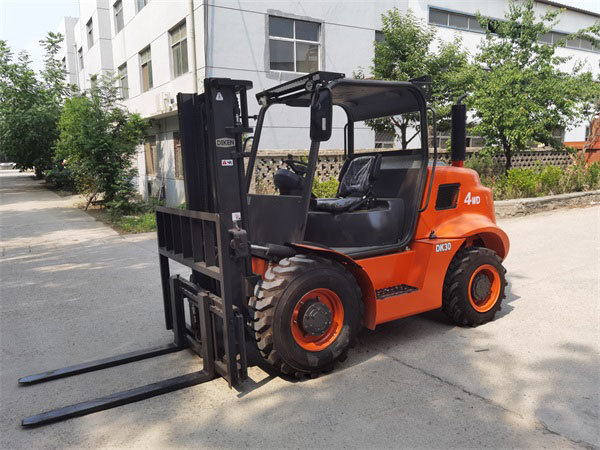Diken news
Maximize Your Investment: A Comprehensive Guide to Maintaining Your 2 Ton Rough Terrain Forklift for Long-lasting Performance
Release time: 2025-04-23
Maximize Your Investment: A Comprehensive Guide to Maintaining Your 2 Ton Rough Terrain Forklift for Long-lasting Performance
Table of Contents
- 1. Introduction to Rough Terrain Forklifts
- 2. Understanding Forklift Maintenance
- 3. Essential Maintenance Tips for Your Forklift
- 4. Daily Pre-Operational Checks
- 5. Weekly and Monthly Maintenance Schedules
- 6. The Importance of Cleaning Your Forklift
- 7. Troubleshooting Common Issues
- 8. When to Seek Professional Help
- 9. Conclusion
- 10. FAQs
1. Introduction to Rough Terrain Forklifts
Rough terrain forklifts are invaluable assets in various industries, particularly in agriculture and construction. Designed to operate on uneven surfaces, these forklifts excel in environments where conventional forklifts would falter. Given their unique capabilities, maintaining a **2 ton rough terrain forklift** is crucial for ensuring reliable performance and longevity. This guide offers detailed insights into the best practices for caring for your equipment, helping you maximize your investment.
2. Understanding Forklift Maintenance
Regular maintenance is essential for any machinery, and **forklifts** are no exception. A well-maintained forklift ensures safety, efficiency, and productivity. Understanding the components that require attention can help you establish a solid maintenance routine. Key areas of focus include:
- **Hydraulic systems**: Essential for lifting and operating the forklift.
- **Electrical systems**: Critical for ignition and overall operation.
- **Tires and braking systems**: Vital for stability and control on rough terrain.
- **Engine and transmission**: Integral for power and movement efficiency.
Taking a proactive approach to maintenance not only extends the life of your forklift but also reduces the likelihood of costly repairs.
3. Essential Maintenance Tips for Your Forklift
To ensure your **2 ton rough terrain forklift** operates efficiently, consider the following essential maintenance tips:
Regular Inspections
Conduct routine inspections to identify any potential issues before they escalate. Keep an eye on fluid levels, tire condition, and overall cleanliness.
Change Fluids Regularly
Regularly changing the engine oil, hydraulic fluid, and transmission fluid helps maintain optimal performance. Follow the manufacturer’s recommendations for fluid change intervals.
Inspect and Replace Filters
Air and fuel filters should be checked and replaced as needed. Clogged filters can hinder performance and lead to engine issues.
Battery Maintenance
If your forklift is electric, ensure the battery is regularly charged and that terminals are clean. Inspect for any signs of corrosion or damage.
Brake System Checks
Inspect the brake pads and fluid levels regularly. A well-functioning braking system is crucial for operator safety.
4. Daily Pre-Operational Checks
Each day before operating your forklift, conduct a series of pre-operational checks to ensure everything is functioning properly. This can include:
- **Fluid Levels**: Check engine oil, hydraulic fluid, and coolant levels.
- **Tire Condition**: Inspect for wear and proper inflation.
- **Brakes and Steering**: Test the brakes and ensure steering is responsive.
- **Lights and Horn**: Ensure all lights are functioning, and the horn operates correctly.
These daily checks can catch minor issues before they become major problems, enhancing safety and productivity.
5. Weekly and Monthly Maintenance Schedules
Creating a structured maintenance schedule can significantly improve forklift performance.
Weekly Maintenance Tasks
- Inspect the tires for wear and ensure proper inflation.
- Clean the forklift, focusing on the engine and hydraulic systems.
- Check battery connections and clean as necessary.
Monthly Maintenance Tasks
- Change engine oil and filters, following the manufacturer's guidelines.
- Inspect all hydraulic hoses and connections for leaks.
- Examine the forklift's structure for any signs of wear or damage.
6. The Importance of Cleaning Your Forklift
Maintaining a clean forklift is often overlooked but is crucial for optimal performance. Dirt and debris can accumulate in hard-to-reach areas, leading to mechanical issues. Regular cleaning can:
- Prevent corrosion and rust.
- Enhance visibility for operators.
- Increase the lifespan of various components.
Make cleaning a part of your maintenance routine to keep your forklift running smoothly.
7. Troubleshooting Common Issues
Despite regular maintenance, forklift issues may still arise. Here are some common problems and their solutions:
Engine Won't Start
- Check the battery and connections for corrosion.
- Inspect fuel levels and ensure the fuel filter is clean.
Poor Lifting Performance
- Examine hydraulic fluid levels and check for leaks in the system.
- Inspect the lift chains and mast for obstructions or damage.
Excessive Noise
- Investigate the source of the noise. It could be a sign of worn parts or inadequate lubrication.
Addressing these issues promptly can save time and money and enhance safety.
8. When to Seek Professional Help
While many maintenance tasks can be performed in-house, some issues may require professional intervention. If you encounter problems that are beyond your expertise or if there are persistent issues despite regular maintenance, it’s essential to consult a qualified forklift technician. Professional maintenance can help ensure the safety of operators and the longevity of your equipment.
9. Conclusion
Maintaining your **2 ton rough terrain forklift** is essential for ensuring its longevity and optimal performance in challenging environments. By following a structured maintenance plan, conducting daily checks, and understanding common issues, you can maximize your investment and minimize downtime. Regular maintenance not only enhances safety but also boosts productivity, allowing your machinery to serve you well for years to come.
10. FAQs
1. How often should I perform maintenance on my forklift?
Perform daily checks before use, with more comprehensive weekly and monthly maintenance schedules.
2. What are the signs that my forklift needs maintenance?
Common signs include unusual noises, poor lifting performance, and starting issues.
3. Can I clean my forklift with a pressure washer?
While a pressure washer can be effective, avoid directing water into sensitive areas like electrical connections.
4. What should I do if my forklift is leaking hydraulic fluid?
Stop using the forklift immediately and consult a professional technician to inspect and repair the leak.
5. How can I enhance the lifespan of my forklift?
Regular maintenance, cleaning, and addressing issues promptly are key to extending the lifespan of your forklift.
By adhering to these guidelines, you can ensure that your **rough terrain forklift** remains a dependable tool in your operational arsenal, ready to tackle any challenge it encounters.
Keywords: 2 ton rough terrain forklift










